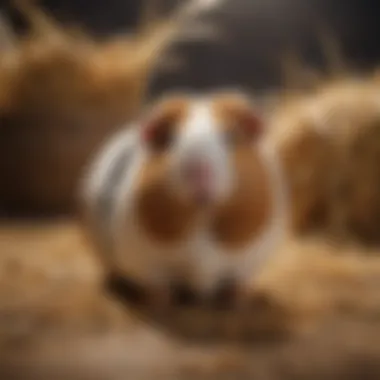Comprehensive Guide to Feeding Guinea Pigs: Nutrition Tips


Intro
Feeding guinea pigs properly is crucial for their health and longevity. Understanding what these small animals need is essential for every owner. Guinea pigs have specific dietary requirements that differ from other pets. When the right balance of nutrients is provided, they thrive.
This guide aims to clarify what constitutes a suitable diet for guinea pigs. It covers various food types, essential nutrients, and safe feeding practices. From hay and pellets to fresh vegetables and fruits, each component plays a vital role. We'll also address common mistakes owners make and tips for ensuring dietary balance. Discussing how to introduce new foods safely will be important too.
By the end, you will gain a thorough understanding of how to nourish your guinea pig properly.
Nutritional Needs of Guinea Pigs
Understanding the nutritional needs of guinea pigs is crucial for their overall health and well-being. These small animals require a balanced diet that includes a variety of nutrients essential for proper growth, digestion, and immune function. Neglecting their specific dietary needs can result in severe health issues, making it vital for pet owners to be aware of the proper components for their guinea pigs’ diet. This section will explore the basic nutrients that guinea pigs need, with a focus on vitamins, minerals, fiber, and proteins.
Understanding Basic Nutrients
Vitamins
Vitamins are organic compounds that are vital for guinea pigs' bodily functions. They assist in numerous biological processes, including metabolism and immune function. One key characteristic of vitamins is that they cannot be synthesized within the body and must be obtained through diet. In this guide, the focus will be primarily on Vitamin C, as guinea pigs have a unique requirement for it. Without sufficient levels of Vitamin C, guinea pigs can suffer from scurvy, which leads to health complications. Thus, including vitamin-rich foods in their diet is important for maintaining their health.
Minerals
Minerals play a critical role in maintaining guinea pigs' health. They contribute to bone development, nerve function, and muscle contraction. A distinctive feature of minerals is that they are inorganic compounds, meaning they do not contain carbon. Including minerals in their diet can prevent deficiencies that might lead to serious conditions such as bone disorders. The right balance is important; while minerals are essential, too much of certain minerals like calcium can cause urinary problems.
Fiber
Fiber is an essential component of a guinea pig's diet, contributing significantly to digestive health. It helps maintain healthy gut function and ensures that food passes through the digestive system effectively. The unique characteristic of fiber is its ability to promote regular bowel movements. Additionally, fiber assists in wear on their continually growing teeth. Therefore, having a diet rich in fiber is beneficial and is often achieved through the provision of high-quality hay, which should be a primary food source for guinea pigs.
Proteins
Proteins serve as the building blocks for tissues and are important for growth and repair. The essential amino acids found in proteins are critical for various bodily functions. However, it's necessary to be careful with the amount of protein in a guinea pig's diet. High levels may lead to health issues, such as obesity or kidney strain. Choosing moderate protein sources is advisable to ensure they get enough without overwhelming their system.
Importance of Vitamin
Vitamin C is especially significant in the diet of guinea pigs due to their inability to produce it naturally. This vitamin supports many physiological processes, including collagen formation and immune system functionality. Keeping adequate levels of Vitamin C in their diet can help mitigate the risk of numerous health ailments.
Sources of Vitamin
There are numerous sources of Vitamin C suitable for guinea pigs. Fresh vegetables such as bell peppers, broccoli, and leafy greens are rich in this nutrient. Fruits can also provide Vitamin C, although they should be given sparingly due to sugar content. The key characteristic of these sources is that they offer a bioavailable form of Vitamin C that guinea pigs can easily absorb. So, making these foods a staple in their diet is an effective way to ensure they receive enough Vitamin C.
Daily Requirements
Guinea pigs require a specific amount of Vitamin C daily to maintain optimal health. An adult guinea pig typically needs around 10-30 mg of Vitamin C per day. This requirement can vary based on factors such as age, health status, and level of activity. Monitoring their intake is important to avoid deficiencies. Consistent feeding of fresh fruits and vegetables helps meet these daily requirements. Regular assessment of their diet can lead to healthier and happier guinea pigs.
Primary Diet Components
The primary diet components are essential for maintaining the health and well-being of guinea pigs. These components shape the dietary foundation, ensuring they receive proper nutrition. By focusing on two main categories—hay and pellets—this section illuminates their significance in a balanced diet.
Importance of Hay
Hay serves as a core diet component for guinea pigs. It is rich in fiber and plays a vital role in digestion. Additionally, hay helps in preventing dental problems, as guinea pigs need to chew to keep their teeth healthy. Hay should constitute the majority of their diet.
Types of Hay
There are various types of hay suitable for guinea pigs. Timothy hay stands out due to its high fiber content. Meadow hay is another option that can offer variety. Each type has unique benefits; for instance, Timothy hay supports digestive health effectively. However, the most important characteristic is that hay must be fresh and free from mold. Guinea pigs benefit from having different types to prevent boredom and encourage a varied diet.
Feeding Practices
Feeding practices regarding hay are equally significant. It should be accessible at all times. Guinea pigs will eat hay whenever they feel hungry or need to snack. Regularly check the hay for quality, as stale or dusty hay can cause health issues. The key feature here is consistency in providing hay; it is crucial for maintaining their well-being. Additionally, this practice encourages their natural grazing behaviors, crucial for their happiness and health.


Pelleted Food
Pelleted food is another crucial component of a guinea pig's diet. It is designed to deliver balanced nutrition in every bite. Quality pellets can provide vitamins and minerals necessary for their growth and lifestyle.
Choosing Quality Pellets
When selecting pellets, consider those that are specifically formulated for guinea pigs. Look for high-quality brands that do not contain additives like seeds, which may be harmful. The essential characteristic of these pellets is their ability to offer a balanced diet in a convenient form. They often have vitamin C added, ensuring guinea pigs get this vital nutrient which they cannot produce themselves.
Feeding Quantities
Feeding quantities is a critical aspect of a guinea pig's diet. It is important to follow guidelines on how much to feed them, as overfeeding can lead to obesity. Generally, a quarter cup of pellets per day is adequate for an adult guinea pig. However, individual needs may vary based on size, health, and activity level. Adhering to feeding quantities promotes a healthy lifestyle and prevents associated health issues.
Fresh Vegetables
Fresh vegetables are a vital part of a guinea pig's diet. They provide essential nutrients, contribute to hydration, and offer opportunities for variety. A balance of fresh vegetables can help prevent boredom and keep your guinea pig engaged and healthy. The right selection can enhance overall health and contribute positively to the dietary needs outlined earlier in this guide.
Recommended Vegetables
Leafy Greens
Leafy greens are among the best sources of nutrition for guinea pigs. They are low in calories but high in vitamins and minerals, particularly Vitamin C. Popular choices include romaine lettuce, kale, and spinach. Their high moisture content also assists in hydration. The attraction of leafy greens lies in their nutrient density, making them a beneficial choice. However, it is important to diversify the greens fed to avoid any potential issues with high oxalate content, which can affect kidney health if consumed in excess.
Root Vegetables
Root vegetables like carrots and bell peppers provide a good source of energy and essential vitamins. They are rich in carbohydrates and can be a good addition to the diet in moderation. Their crunchiness can also satisfy your guinea pig's natural chewing instincts. Though they can be a popular choice due to their taste and texture, owners should be cautious with portion sizes. These veggies can be high in sugar, which can lead to health problems if given in large amounts.
Avoiding Harmful Vegetables
Nightshades
Nightshades, such as tomatoes and eggplants, should be avoided in guinea pig diets. These plants contain solanine, which can be toxic to guinea pigs. The risks associated with consuming nightshades can cause serious health issues in these animals. It's essential for owners to educate themselves on these vegetables to prevent accidental feeding. Safe consumption practices must be employed to ensure the well-being of your guinea pig.
High-Starch Vegetables
Vegetables like potatoes and corn are high in starch. This high starch content can lead to digestive problems in guinea pigs. Feeding them regularly may increase the risk of obesity. It is best to limit these types of vegetables in their diet. There are many healthier alternatives available to provide variety without the risks associated with high starch content.
Fresh vegetables play an important role in maintaining your guinea pig's well-being. Careful selection and management of their intake can lead to a happier, healthier pet.
Suitable Fruits
In this section, we will discuss the role of suitable fruits in the diet of guinea pigs. Fruits can provide essential vitamins, antioxidants, and hydration, enhancing overall health. However, not all fruits are appropriate for these animals. Understanding which fruits to include and which to avoid is crucial for maintaining dietary balance.
Fruits to Include
Berry Varieties
Berries, such as strawberries, blueberries, and raspberries, are an excellent addition to a guinea pig's diet. They are low in calories and high in vital nutrients. Berries are rich in Vitamin C, which is important for guinea pigs since they cannot produce it themselves. The vibrant color of these fruits indicates the presence of antioxidants that support the immune system.
Additionally, berries tend to contain a good amount of fiber, aiding in digestive health. However, moderation is key; too many berries can cause digestive upset. Their natural sweetness makes them a popular choice for small animals. Thus, they can help in training or bonding sessions with your pet.
Citrus Fruits
Citrus fruits, including oranges, lemons, and limes, offer some benefits in a guinea pig's diet. These fruits are also high in Vitamin C, making them valuable for preventing deficiency. Their juiciness can add hydration to your guinea pig's meals. The acidic nature of citrus fruits is one of the reasons to offer them in limited amounts.
While guinea pigs enjoy the taste of citrus, it's best to introduce these fruits gradually to check for any digestive issues. Overconsumption may lead to stomach discomfort due to acidity. Therefore, it is essential to balance their inclusion with other foods.
Fruits to Avoid
High Sugar Fruits


Certain fruits, such as bananas and grapes, are high in sugar. While they may be tasty, these fruits can lead to obesity and other health problems if fed regularly. High sugar content can contribute to insulin resistance and dental issues in guinea pigs. Instead of regular inclusion, these should be considered rarely as a treat.
When you do opt for high sugar fruits, serving them in tiny portions can help mitigate the risks. Stick to offering these foods infrequently to ensure your pet remains healthy overall.
Dried Fruits
Dried fruits are often marketed as healthy snacks but can pose significant risks for guinea pigs. They often contain concentrated sugars and lack the moisture found in fresh fruits. This can lead to digestive problems and increased risk of obesity.
The dehydration process can result in the loss of vital nutrients as well. Therefore, it is wise to avoid dried fruits entirely in a guinea pig's diet. Instead, fresh fruits should be encouraged to provide the necessary hydration and nutrition.
Feeding your guinea pig a balanced diet is essential for their health! Stick to suitable fruits to ensure they get the best nutrition possible.
Common Feeding Mistakes
Feeding guinea pigs correctly is essential for their health and well-being. Many pet owners make simple mistakes that can lead to serious dietary issues. Understanding these common feeding mistakes helps ensure that guinea pigs lead a healthy and happy life. This section focuses on two main areas: overfeeding versus underfeeding and the role of diet variety.
Overfeeding and Underfeeding
Signs of Overfeeding
Overfeeding is a frequent mistake that many pet owners make. Guinea pigs can rapidly gain weight when their diet is too rich or too large in portions. A key characteristic of overfeeding is an increase in body weight, which can lead to obesity. This is concerning as obesity can lead to various health issues in guinea pigs, such as heart disease or diabetes. Signs to look for include a noticeable roundness in their body shape and difficulty in movement.
The important aspect here is portion control. Feeding the right amount prevents these health problems. While it may seem popular to provide extra food as a treat, it can be detrimental to their health in the long run. Overfeeding has the disadvantage of not allowing fiz health to absorb nutrients properly. Instead, it leads to wasted food and an unbalanced diet.
Signs of Underfeeding
Underfeeding is just as harmful, though perhaps not as common as overfeeding. The signs of underfeeding may include weight loss and lethargy. A key characteristic indicating underfeeding is a noticeable ribcage or lack of energy. Low energy levels can significantly affect a guinea pig's quality of life.
The unique feature of underfeeding is that it often goes unnoticed. Owners may believe they are providing enough food while neglecting their nutritional needs. This can lead to severe health consequences, including stunted growth in young guinea pigs and nutritional deficiencies in adults. Therefore, ensuring a balanced intake of food is critical for overall health and wellness.
Neglecting Variety
The Role of Variety in Diet
Variety plays a vital role in maintaining a balanced diet for guinea pigs. A diverse diet ensures that they receive all the essential nutrients. Neglecting variety can lead to deficiencies and health issues. A key characteristic here is that different fruits and vegetables provide unique vitamins and minerals. Introducing various foods keeps meals interesting and encourages better eating habits.
Ensuring a broad range of food sources can help prevent boredom. Boredom can lead to stress and unwanted behaviors in guinea pigs. Therefore, including multiple food types is not just beneficial; it is essential for keeping guinea pigs mentally stimulated as well.
How to Introduce New Foods
Introducing new foods requires a careful approach. Start by offering small amounts of any new fruits or vegetables. This way, you can monitor for any adverse reactions. A key characteristic of this method is its gradual nature, allowing guinea pigs to adapt to new tastes and textures. It is a beneficial choice as it allows pet owners to track any dietary issues that may arise.
The unique feature of introducing small quantities of new foods is that it minimizes waste and ensures that you maintain control over their diet. Additionally, this method encourages exploration of different food options, vital for enhancing the variety in their daily meals.
"Maintaining a balanced diet is crucial for the well-being of guinea pigs. Understanding feeding mistakes can significantly improve their health and happiness."
Dietary Adjustments for Health Issues
In the world of guinea pig care, dietary adjustments for health issues stand out as crucial. Just like humans, guinea pigs can face various health problems that may influence their dietary needs. Altering their diet helps in managing these issues effectively. A tailored diet ensures that your guinea pig receives the right nutrients, keeps their system running smoothly, and supports recovery. Understanding how to adjust their diet according to specific health conditions is vital for all guinea pig owners.
Adjusting for Weight Management
Low-Calorie Options
When managing weight, low-calorie options become a significant tool. These foods help in reducing caloric intake without sacrificing essential nutrients. Therefore, selecting foods that are naturally low in calories can make a difference. Examples include certain leafy greens like romaine lettuce and bell peppers. They are high in water content, making them filling, yet low in calories. This quality makes them a beneficial choice in ensuring your guinea pig maintains a healthy weight.
The unique feature of low-calorie options is their ability to provide bulk without excess energy. It allows your guinea pig to eat freely without gaining unwanted weight. However, it's important to balance these options with sufficient vitamins and minerals, ensuring your pet's nutritional needs are still met.


Portion Control
Another significant aspect of weight management is portion control. It refers to the practice of providing the appropriate amounts of food each day tailored to the specific needs of your guinea pig. This approach can prevent both overfeeding and underfeeding, leading to a more balanced diet.
Portion control is a beneficial choice because it ensures your pet receives the right amount of nutrients without excess fat. It prevents health issues like obesity or malnutrition. The unique feature of portion control is its flexibility; you can adjust the portions based on your guinea pig’s changing needs. One must remain vigilant, as over-restricting food can lead to stress or behavioral issues. Thus, finding the right balance is crucial.
Dietary Needs for Older Guinea Pigs
Age-Specific Nutritional Needs
As guinea pigs age, their nutritional needs evolve. Age-specific nutritional needs focus on providing the right balance of nutrients to support senior pigs. Older guinea pigs may struggle with digestion and absorption due to age, making it vital to adjust their diet accordingly.
These adjustments often include higher fiber content to aid digestion and reduced protein levels to prevent kidney strain. This age-specific focus is a beneficial approach for maintaining health and vitality, as it targets the unique challenges that come with aging.
The unique feature of these nutritional needs is their emphasis on quality over quantity. A well-structured diet can significantly enhance the quality of life for elderly guinea pigs, but failure to adapt can lead to health issues that are difficult to manage.
Feeding Recommendations
Implementing effective feeding recommendations is essential for older guinea pigs. These recommendations often include more frequent, smaller meals rather than large portions. This approach can help accommodate their slowed metabolism and digestive issues, allowing for proper nourishment without overloading their system.
Feeding recommendations focus on selecting foods that are softer, easier to chew, and digest. A beneficial approach includes introducing high-quality hay, soft veggies, and fresh fruits in moderation. The unique feature of these recommendations is their ability to enhance your guinea pig's quality of life during more challenging years. With proper management, senior guinea pigs can continue to thrive.
Proper dietary adjustments can significantly enhance the health and well-being of your guinea pig, so always observe and react to their individual needs.
Monitoring Health Through Diet
Understanding the link between diet and overall health is crucial for guinea pig owners. Monitoring health through what these animals eat allows pet owners to prevent potential health issues, ensuring their furry friends thrive. A well-balanced diet directly impacts the behavior, activity levels, and digestive health of guinea pigs. This section highlights various elements that indicate dietary adequacy or insufficiency.
Behavioral Indicators of Dietary Issues
Changes in Activity Levels
Changes in activity levels can provide critical insight into a guinea pig's health. When a guinea pig experiences a decrease in activity, it may signal dietary deficiencies or imbalances. For instance, if a guinea pig is lethargic, it might not be receiving enough fiber or essential vitamins. Conversely, increased hyperactivity could point towards high sugar intake. Monitoring these changes helps guide changes in diet to improve overall well-being.
The key characteristic of changes in activity levels lies in its ability to act as an early warning system. Recognizing this behavior allows for timely adjustments in their nutrition. For example, a decrease in movement can highlight the need to focus on more nutrient-rich foods with adequate fiber. This advantage makes it a significant factor in assessing a guinea pig's dietary health.
However, one must approach changes in activity with context. Other factors such as environmental changes or stress can also cause fluctuations in behavior.
Signs of Digestive Distress
Signs of digestive distress are another critical aspect of monitoring health through diet. Symptoms such as diarrhea, bloating, or a noticeable change in droppings can indicate dietary problems. For instance, a diet lacking in fiber often leads to severe digestive issues, as guinea pigs require ample fiber to maintain gut health.
The key characteristic of signs of digestive distress is that they often arise quickly, allowing for immediate dietary evaluation. Noticing these signs early can help prevent more severe health issues. Therefore, understanding these indicators is essential for pet owners concerned with the well-being of their pets.
Yet, it is also pertinent to consider how stress or illness might imitate digestive problems. Thus, confirming diet-related problems calls for careful observation and possibly professional advice.
Regular Vet Check-ups
Regular veterinary check-ups are vital for maintaining the health of guinea pigs. They help ensure that dietary needs are met and allow for timely interventions if issues arise. Establishing a relationship with a veterinarian will also facilitate guidance on dietary requirements as health changes.
Importance of Nutritional Assessments
Nutritional assessments during vet visits can profoundly impact a guinea pig's long-term health. These assessments typically examine the quality and quantity of food being provided. By understanding a guinea pig's individual needs, owners can tailor their diet effectively.
The key characteristic of nutritional assessments is their customized approach. Every guinea pig is unique, requiring different nutrients based on age, weight, and health status. This personalized approach can uncover specific dietary gaps that need addressing. Thus, regular assessments allow owners to adapt the feeding strategy as necessary, ensuring optimal health.
Nonetheless, assessments can sometimes be overlooked due to misconceptions of guinea pig care, emphasizing the need for education among pet owners.
Creating a Diet Plan with Your Vet
Creating a diet plan with a veterinarian is a proactive measure for guinea pig care. A well-structured diet plan takes into account all nutritional aspects while allowing for adjustments based on ongoing health evaluations. This plan can reassure pet owners that they are meeting their guinea pig's needs adequately.
The key characteristic of collaborating with a veterinarian in diet planning is the collective expertise that combines general knowledge with specific insights about your pet. A custom diet plan aims to enhance health, prevent disease, and promote longevity.
However, not all vets may be well-versed in guinea pig nutrition; finding a veterinarian with experience in small animals is beneficial. This is a potential disadvantage, but it emphasizes the importance of owner diligence in finding the right professional aid.







